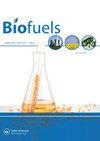Potential use of thermophilic bacteria for second-generation bioethanol production using lignocellulosic feedstocks: a review
IF 2.6
4区 工程技术
Q3 ENERGY & FUELS
引用次数: 0
Abstract
Abstract One of the promising feedstock over the present first-generation feedstock for renewable and cost-effective bioethanol production is lignocellulosic biomass (LCB). In recent years, various efforts have been invested in producing bioethanol from LCB using thermophilic bacteria, which have various advantages over their mesophilic counterparts. Their broad substrate range and production of different thermostable enzymes for degrading different polymeric precursors make them a promising candidate for bioethanol production from LCB. However, thermophilic bacteria have certain disadvantages, like low bioethanol tolerance and yield, making their use difficult for industrial applications. Modification of culture parameters and evolutionary adaptations are alone not enough to pave the path for higher bioethanol production from thermophiles. This review provides an overview of thermophilic bacteria, focusing on the recent developments in genetic engineering techniques for increasing ethanol tolerance and creating higher ethanologenic strains. Additionally, this review explores the milestones of reported thermophilic bacteria to produce bioethanol using LCB as a substrate.利用木质纤维素原料生产第二代生物乙醇的嗜热细菌的潜在用途综述
摘要木质纤维素生物质(LCB)是目前可再生且具有成本效益的生物乙醇生产的第一代原料中有前途的原料之一。近年来,人们投入了各种努力,利用嗜热细菌从LCB生产生物乙醇,与嗜温细菌相比,嗜热细菌具有各种优势。它们的底物范围广,能产生不同的热稳定酶来降解不同的聚合物前体,这使它们成为从LCB生产生物乙醇的有前途的候选者。然而,嗜热细菌有一些缺点,如生物乙醇耐受性和产量低,使其难以在工业应用中使用。仅凭培养参数的改变和进化适应不足以为嗜热菌产生更高的生物乙醇铺平道路。这篇综述概述了嗜热细菌,重点介绍了基因工程技术的最新进展,以提高乙醇耐受性和创造更高的产乙醇菌株。此外,这篇综述探讨了已报道的嗜热细菌使用LCB作为底物生产生物乙醇的里程碑。
本文章由计算机程序翻译,如有差异,请以英文原文为准。
求助全文
约1分钟内获得全文
求助全文
来源期刊

Biofuels-Uk
Energy-Renewable Energy, Sustainability and the Environment
CiteScore
5.40
自引率
9.50%
发文量
56
期刊介绍:
Current energy systems need a vast transformation to meet the key demands of the 21st century: reduced environmental impact, economic viability and efficiency. An essential part of this energy revolution is bioenergy.
The movement towards widespread implementation of first generation biofuels is still in its infancy, requiring continued evaluation and improvement to be fully realised. Problems with current bioenergy strategies, for example competition over land use for food crops, do not yet have satisfactory solutions. The second generation of biofuels, based around cellulosic ethanol, are now in development and are opening up new possibilities for future energy generation. Recent advances in genetics have pioneered research into designer fuels and sources such as algae have been revealed as untapped bioenergy resources.
As global energy requirements change and grow, it is crucial that all aspects of the bioenergy production process are streamlined and improved, from the design of more efficient biorefineries to research into biohydrogen as an energy carrier. Current energy infrastructures need to be adapted and changed to fulfil the promises of biomass for power generation.
Biofuels provides a forum for all stakeholders in the bioenergy sector, featuring review articles, original research, commentaries, news, research and development spotlights, interviews with key opinion leaders and much more, with a view to establishing an international community of bioenergy communication.
As biofuel research continues at an unprecedented rate, the development of new feedstocks and improvements in bioenergy production processes provide the key to the transformation of biomass into a global energy resource. With the twin threats of climate change and depleted fossil fuel reserves looming, it is vitally important that research communities are mobilized to fully realize the potential of bioenergy.
 求助内容:
求助内容: 应助结果提醒方式:
应助结果提醒方式:


